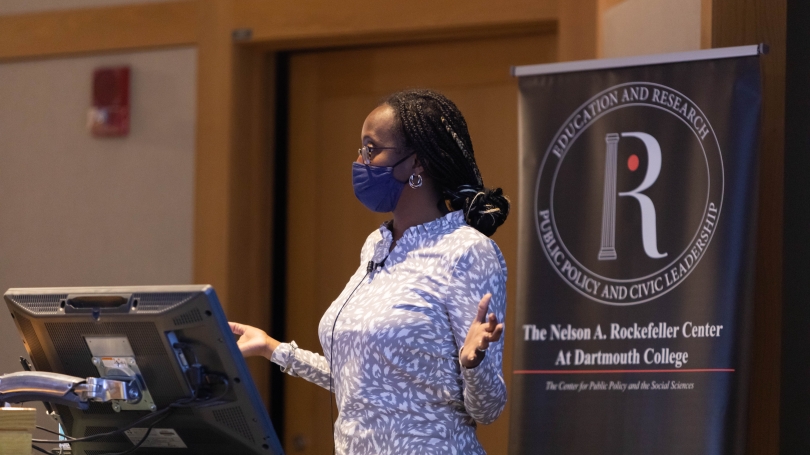
- Public Policy
- Leadership
- Funding
- News & Events
- About the Center
Back to Top Nav
Back to Top Nav
Back to Top Nav
Back to Top Nav
On January 27, 2022, Cornell University Associate Professor Jamila Michener delivered the Rockefeller Center's Roger S. Aaron '64 lecture titled "Uncivil Democracy: Race, Poverty, and Civil Legal Inequality." Hosted by Rockefeller Center Policy Fellow and Assistant Professor of Government Herschel Nachlis, Michener shared ethnographic evidence gathered from her experiences interviewing individuals and organizations tangled in the civil legal system, provided critical background on the importance of the system, and described the myriad factors that make attaining justice in the system so important, particularly for individuals in low-income communities.
As Michener first noted, the distinction between civil and criminal law is not one many people in the United States make, especially when the latter dominates popular culture and therefore our understanding of the U.S. legal system. While the criminal system is often seen as the "punitive" face of the state, where cases are often brought forth by a state or federal government, the civil system is the "protective" one, ensuring that there is a "neutral party who can arbitrate issues that can lead to exploitation or harm." Civil cases often involve a private dispute between two individuals that can range from divorce proceedings or cases involving child custody and disputes between landlords, mortgage lenders, and/or tenants to getting an order of protection in a domestic violence case. All of these key issues, Michener emphasized, "touch on so many aspects of people's daily lives," especially for people "who are most vulnerable, often most marginalized, and least able to access legal resources."
According to the LSC's (Legal Services Corporation) 2017 Justice Gap report, Michener noted, not only are low-income individuals more likely to find themselves in civil court, but at least one in four low-income people surveyed said they had at least six civil legal problems. Furthermore, while both the civil and criminal systems are both "racialized" (in the sense that the majority of individuals that enter the system are people of color), the civil system sees participation from a much greater proportion (72%) of women. This puts a great deal of pressure, Michener argued, on low-income women of color.
As an intern at a legal firm that assisted low-income community members in Queens, New York with their civil legal disputes, Michener remembered asking why the current system worked as it did: unable to support those entering courts and underfunding organizations that sought to help low-income communities gain access to legal advice. In particular, the fact that the civil courts do not entertain the right to an attorney (unlike criminal court) only exacerbated existing system inequalities between low-income individuals appearing in court and the opposing side that often had a lawyer.
Today, Michener explained, as a political scientist she spends her time examining the consequences that such a crucial yet "profoundly unequal" system can have on democracy. Each of the three main facets of the civil legal system—the courts, legal aid organizations that help individuals navigate courts, and community organizations that connect people with legal aid and mobilize to improve outcomes both inside and outside the courtroom—impact the political, social, and civil components of democratic citizenship, Michener argued. To measure these effects, Michener has conducted over seventy interviews with "key actors" in the system, including people with legal problems who never sought assistance, people who sought but never received legal assistance, civil legal aid beneficiaries, attorneys, and members of grassroots organizations. "If I want to understand some of the relationships, some of the connections, some of the processes linking democratic citizenship to civil legal institutions," she explained, "I needed to get on the ground with people and understand their experiences, their perspectives."
These interviews, in addition to observation done in courtroom and community meetings around the country, was done with a focus on housing cases. Not only do such cases comprise most civil legal cases, Michener said, but housing can be a "driver of inequality" for the low-income, marginalized communities that often rely on the civil legal system the most.
As she completed interviews, Michener began to characterize interactions between individuals and the civil legal system in three key ways: by "inform[ing] political perceptions (i.e. perceptions of other actors in the system)," "motivat[ing] political action," and "build[ing] political power and capacity." The latter two in particular were a surprise to Michener; though she "went into this project with very much a deficit story in mind," she explained, she found that local grassroots organizations play a significant role in mobilizing and unifying communities through initiatives such as leading eviction blockades that deter unjust evictions, going door-to-door to explain their mission to community members and gather traction for larger projects such as legalizing the right to counsel, and taking courtroom notes to publish online (when public record requests were ignored) to bring light to the racism degrading the legal process. However, these efforts have yet to overcome the ongoing obstacles individuals face when dealing with the most powerful institution: the courts. Given these findings, Michener concluded that these grassroots institutions that are "trying to build the power are least resourced, least supported, and not embedded in a way institutionally that gives them a wide reach."
That said, Michener concluded, addressing the issues central to inequities in the civil legal system and empowering legal and community institutions that can aid those navigating the system are ongoing and critical initiatives that can have significant impacts on everyday quality of life for communities all over the United States. "This is a complex, nuanced, multifaceted process, but it's one that is profoundly important for people's lives, one we should all be aware of and certainly be thinking about, and one that I hope we can see transformative change in the years to come."
Written by Shawdi Mehrvarzan '22, Rockefeller Center Student Assistant for Public Programs